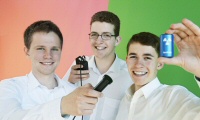Accept
Details & settings
This website uses cookies for cookie consent and statistics.
Stefan Heimersheim, Josef Nagelschmidt, Frank Hartmann

Since the dawn of quantum mechanics, quantum entanglement has been considered to be one of the most remarkable phenomena in physics. Therefore, there has been a long discussion about the nature of quantum entanglement since its theoretical prediction in the early nineteenth century. This discussion was about physical reality, the principle of locality and the integrity of quantum mechanics as a theory. Einstein could also not accept with the "spooky action at a distance" between two particles which apparently involved a faster than light exchange of information, thus he introduced his version of quantum theory, namely the hidden variables interpretation.
However, in 1964 John Stewart Bell paved the way for the demonstration that Einstein's interpretation was wrong and thus enabled the clarification of the conflict. Quantum entanglement experiences a time of rapidly increasing importance nowadays, due to its high innovation capacity in cryptography as well as computational power. Despite this fact, a demonstration experiment is still unaffordable for schools and that is why the students cannot gain an insight into this field of modern physics.
Hence, we decided to develop an experiment that is affordable for schools, as well as practicable in class. Our approach makes use of the generation of entangled photons via positron-electron-annihilation. In order to measure the photons' entangled property, the polarization, we utilize Compton polarimetry and perform calculations with the Klein-Nishina-differential scattering cross section. In this way, we can find out about the relative polarization between the two particles, detecting the photons with two Geiger-Müller counters and analyzing the signals via a self-built coincidence circuit.
Our measurements and results are in good agreement with quantum-mechanical calculations, providing clear violation of Einstein's principle of locality for quantum-mechanical processes. Additionally, we achieved a reduction of expenses from 6500 € to 200 €.